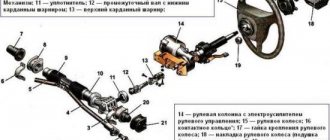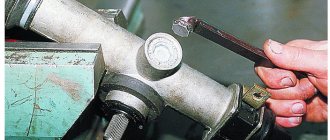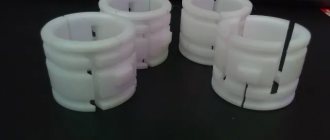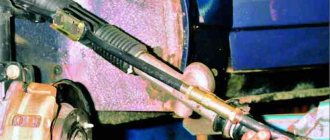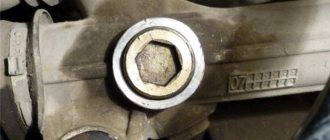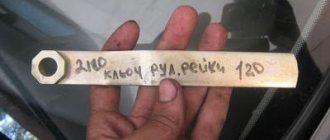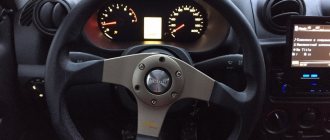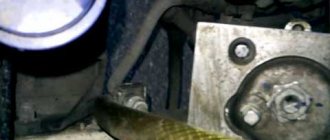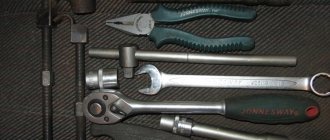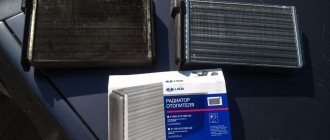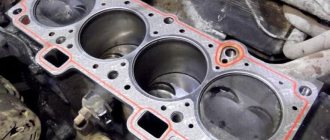Many motorists have encountered the fact that the steering rack on a VAZ-2114, 2113, 2115 began to fail, but not many know how to check. So, let's look at what are the indicators that the rack is faulty. The steering rack is the mechanism that connects the steering wheel to the wheels. Based on this, the correct functioning of this mechanism is the basis of safety, since thanks to this device there is an adequate reaction of the wheels to steering movements.
The design of the steering rack on the VAZ-2114
The design of the steering rack is determined by the steering column shaft, which has a gear mechanism at the end connected to a similar mechanism located on the rack itself. Accordingly, the movements of the steering wheel cause the steering rods to move, and they, in turn, change the angle of rotation of the wheels. Before proceeding directly to the verification process, you need to know the design features of the steering rack. Let's look at what elements it consists of:
1 – protective cap; 2 – steering gear housing; 3 – rack; 4 – drive gear; 5 – inner tie rod end; 6 – spacer sleeve; 7 – tie rod mounting bolt; 8 – connecting plate; 9 – support sleeve; 10 – steering gear support; 11 – rack support sleeve; 12 – protective cover; 13 – clamp; 14 – rack restrictive ring; 15 – sealing ring of the rack stop; 16 – nut; 17 – rack stop; 18 – roller bearing; 19 – ball bearing; 20 – retaining ring; 21 – nut sealing ring; 22 – gear bearing fastening nut; 23 – boot; 24 – lock washer.
General diagram of the steering system, including the racks.
Checking the rack
. So, to check the steering rack, you need to measure the gaps in it. This can be done either on a removed mechanism (which is even better) or directly on the car. Now let's move on to the process: Set the mechanism to the middle position. It can be determined by its dimensions - (87±0.25) mm from the gear axis to the end of the rack. Using a special device, we load the unit to a force P = 500 ± 20 N (51 ± 2 kgf). The distance from the gear axis should be 84 mm. The maximum permissible movement of the rack “X”, measured through the relative movement of the pressure punch 1, should not exceed 0.12 mm. After assembly, the torque of the gear in the area of the rack stroke should be in the range of 50–200 N·cm (5.1–20.4 kgf·cm) at a rotation speed of 30 min-1.
Causes of steering rack failure
Once the issue of rack adjustment has been sorted out, you can consider the reasons for its failure: • Wear. Each car mechanism has its own running life. • Due to uneven roads, the pressure on the rack is significantly increased. • Inadmissible acceleration when the wheels are in the extreme position. • Mechanical damage caused during operation.
How to remove the steering wheel?
Dismantling the steering wheel on VAZ 2114 and 2115 is carried out using the same method. However, remember that according to the Code of Administrative Offenses, replacing a steering wheel with a steering wheel different from the original is considered illegal modification of the steering structure and vehicle control system. Such tuning falls under Part 2 of Article 12.5 of the Code of Administrative Offenses on driving a vehicle in the presence of malfunctions or conditions under which its operation is prohibited.
Recently, traffic police officers have been quite zealous in catching violators of this article, so think carefully before embarking on the replacement process. The standard VAZ 2114 steering wheel looks unattractive, so someone may want to replace it
Required Tools
To remove and then install a new steering wheel, you will need the following tools:
- new steering wheel (make sure the part you choose fits your car);
- set of screwdrivers with straight and Phillips slots;
- 24 mm socket head;
- pencil or marker;
- hammer (in some cases);
- a soft metal drift (included with the hammer);
- wire cores (in some cases).
Please note that after completing all the work, you will have to remove traces of a pencil or marker from the steering wheel cover and front panel. To avoid problems with subsequent cleaning, consider the coating material of these interior elements. You should not use permanent, or as they are also called, indelible markers, especially if the parts are covered with high-quality natural leather of a light shade. The easiest way to remove marker is water-based. But it is better to use a regular pencil: it can be erased with a regular eraser.
Steering wheel removal process
There is a signal inside the steering wheel that receives power from the battery, so the first thing you need to do is turn off the power to the car. To do this, you just need to disconnect the negative terminal. After this, you can safely begin the dismantling process.
- Remove the ignition key from the lock.
- Turn the steering wheel so that the system locking the steering shaft is activated. Your steering wheel is now locked in a straight position.
- In order to subsequently correctly install the new part while maintaining control accuracy, apply a mark to the steering wheel with a pencil. Place a similar mark on the dashboard right next to it.
- Using a straight screwdriver, pry the cover with the Lada inscription on the steering wheel and remove it. This element is attached using ordinary plastic clips, so removing it is not difficult. However, due to the thin plastic, the part breaks easily. If you plan to continue using your old steering wheel, be careful.
- Under the trim you will see two screws. They hold the steering wheel cover. Unscrew them using a Phillips screwdriver and then remove the cover.
- In the central part of the structure you will see a large nut. It should be unscrewed using a 24 mm socket.
- The steering wheel no longer holds anything. To remove it, grab the steering wheel with both hands and pull each side in turn. There's no point in trying. If the part has not been dismantled before, it will be quite difficult to move. Do not try to remove the part with one jerk: you may accidentally injure yourself.
- If attempts to remove the steering wheel using the method described in point 7 are unsuccessful, use a small hammer and drift. In addition to additional tools, you will need an assistant. One person from the pair should pull the steering wheel, and the second should hit the drift attached to the end of the steering shaft with a hammer.
Removing the steering wheel for VAZ 2114 and VAZ 2115
First of all, you need to remove the cover
Work order
Replacing steering bearings on a vehicle such as a VAZ-2110 consists of a number of stages that must be carried out in the order in which they are listed below.
The whole process can be seen in the video:
First, you need to disconnect the battery on the car to prevent an electrical short circuit. It is enough just to remove one terminal where the “-” sign is indicated.
Then you need to remove the steering wheel. To do this, you will need to turn the car's ignition key, and also turn the steering wheel 90° in either direction. You will see a whole row of nuts, thanks to which the steering wheel is attached to the shaft
Using a special wrench, unscrew the nuts, and then carefully proceed to the recess to remove the steering wheel. This is done due to the fact that in some cars there is a system in the steering wheel that allows the steering wheel to be spring-loaded
If you do not take this into account, you may even get injured.
Using a special wrench, you need to unscrew the nuts where the steering column switch mechanisms are secured. Next, their bases must be moved towards the driver’s seat.
Having found the wire connected to the oil pressure sensor, you need to remove it.
Having found the wire connectors going to the car sound signal, you need to disconnect them. Then remove the base for fixing the steering column switch mechanisms from them.
Next, the steering shaft is unlocked with the ignition key.
In the wiring harness you will need to find the wire that goes to the location of the ignition switch. Then disconnect it, if possible, or bite it using pliers.
Bolts with break-away heads, thanks to which the steering deck is fastened, can be replaced with simple M 6 bolts with a length of 20 mm.
After unscrewing 2 nuts and bolts with break-away heads, you need to remove the spring and special washers. In relation to the heads of the bolts that will be torn off, you can drill or turn them out using a screwdriver and a hammer.
Then you need to carefully remove the steering column, pulling it towards you, and then quickly lower it down. Then you need to unscrew the bolt securing the propeller shaft in relation to the steering shaft.
When removing the bolt and removing the column assembly, the thrust bushing is also removed from the shaft.
Next, the shaft with bearings is removed from the pipe. It is advisable to press it out in the direction where the fastening is located.
First of all, the bearing located in front (on the steering wheel side) is removed from the shaft.
When it is discovered that the steering shaft is faulty, it must be replaced with a new one.
To remove the bearings, we also recommend watching the video:
Then you can remove the bearing located at the rear. You can press it out using a drift and a hammer.
Before installing new bearings, it is important to make sure that they rotate easily along the required axis. Bearing bushings made of plastic must be free of defects
Next, the bearing located at the rear is pressed into the pipe collar until it stops using a suitable mandrel. The force is applied exclusively to the outer bearing ring. The bearing is placed on a plastic sleeve. It has a wide flange on one side. When mounting the bearing, just such a sleeve flange must face outward.
The bushings of the bearing located at the front should point towards the shaft.
After this, the shaft is mounted into the pipe
It is important to consider that the bearing located at the rear is placed at the rear end of the steering shaft
Next, you need to firmly secure the bearings into the required rings.
When installing the steering column, the thrust bushing must be placed on the shaft with the side with the larger diameter.
When using special washers, you need to check that they are mounted with the part that protrudes - “a”, in the opposite direction directly from the bolt.
When installing the base of the steering column switch mechanisms, before tightening the bolt, it is important to adjust the location of the base directly on the steering column. To do this, you need to place the casing located below and move the base so that the screw hole in the casing and the base coincide
After this, you need to carefully remove the casing and tighten the base fixing bolt. After installing the steering wheel, you need to diagnose the steering wheel for the absence of extraneous sounds. If there are no extraneous sounds, that’s all!
Replacement of steering shaft bearings for VAZ-2110, VAZ-21102
Changing the bearing shaft of the steering is a fairly simple procedure; thanks to the photo report below, we will consider the principle of this process using the example of a VAZ 2110, VAZ 21102.
To do this, you should have the following tools:
- tools used to remove the steering wheel
- wrench size 13
- head for 13
- regular hammer
We disconnect the wire that goes to the battery terminal, and then get rid of the steering wheel. We do not completely unscrew the bolt holding the base of the steering column switches, the base moves towards itself.
Disconnect the wire from the sensor indicating the oil pressure level.
We move the 2 blocks on which the horn wires are located from the contacts, and then disconnect the base of the switches under the steering wheel. We install the key in the ignition, and then turn it to position I to unlock the steering shaft.
Photo removal procedure
Disconnect the tie rod ends from the strut arms. We unscrew and remove the coupling bolt of the lower flange of the steering shaft coupling and use a screwdriver to loosen the flange.
Using a 13mm spanner, unscrew the 2 nuts of the bracket for the right fastening of the rack to the partition of the engine compartment.
We also remove the left bracket.
We slightly move the steering mechanism forward and remove the drive gear shaft from engagement with the lower flange of the steering shaft coupling.
We turn the rack with the drive gear shaft up and remove it from the engine compartment through the left side.
Source
What kind of steering wheel can I install?
If you decide to replace your old steering wheel, it means that its appearance did not suit you in some way. Of course, the issue may be a breakdown or external damage, however, even in this case, you should consider installing third-party models. What if you like one of them much more than the previous steering wheel?
Sports models
When tuning their iron horses, car enthusiasts often look at sports steering wheels. Their appearance helps create the image of a fashionable racing car. The sports steering wheel has a smaller diameter than a regular steering wheel, which significantly improves maneuverability. In addition, it saves space inside the car. And various design options give room for creativity when styling the rest of the interior.
The design of a sports steering wheel can refresh the interior of the car
Unfortunately, sports steering wheel models have as many disadvantages as advantages. It is not as safe in a collision as the stock steering wheel. Its construction uses metal, so upon impact, the risk of serious injury increases. In addition, sports steering wheels are not equipped with airbags.
To install such a steering wheel you will need special adapters. They can be divided into two categories:
- cast;
- corrugated.
Moreover, the latter are much safer, since in the event of an accident they can fold up and absorb part of the energy.
The corrugated adapter for the sports steering wheel can fold upon impact, therefore it is considered injury-proof
Buy a sports steering wheel from trusted stores and from well-known manufacturers. Make sure you have the appropriate certificate. A poor-quality steering wheel, even with a corrugated adapter, can play a cruel joke on you if you get into an accident.
Steering wheels from other VAZ car models
Steering wheels from more modern models of VAZ cars, such as Lada Priora, Kalina or Granta, look prettier and are much more comfortable in the hands. Installing them will not be difficult, provided that you replace not only the steering wheel itself, but also the steering column column. Otherwise, the hub size will not match.
The Lada Kalina steering wheel looks more stylish and presentable than the standard part from a VAZ 2114 or 2115
Read on to learn how to choose the right steering wheel for the VAZ 2114 and VAZ 2115.
What you need to know when installing
Please note that not every steering wheel is suitable for installation on VAZ 2114 and VAZ 2115 cars. You need to choose a steering wheel with the same contact group as the original part.
choose a steering wheel with the same contact group as that of the VAZ 2114 and 2115
This is quite easy to do if you plan to install a steering wheel from other VAZ models. For example, a steering wheel with a Europanel from a VAZ 2110 is ideal for these purposes.
If you have chosen a Lada Kalina car, then its steering wheel should be marked 1118–3402010. With it you will also have to install the upper casing marked 2110–3403070–30, as well as the lower casing 2110–3403072–30.
To install a non-standard steering wheel on a VAZ 2114, use the steering shaft housing 2110–12
If you like sports models, then you will have to purchase a special adapter designed for VAZ 2113–2115 cars. This adapter is installed on the steering shaft, and the steering wheel is mounted on top. An adapter model suitable for this purpose is PROSPORT RS-04282.
for installing a sports steering wheel on VAZ 2114 and 2115 cars, the PROSPORT RS-04282 adapter is suitable
How to tighten the steering rack on a VAZ 2115
How to tighten or replace the steering rack of a VAZ-2115 Drivers who have at least a little understanding of the structure of a car understand perfectly well that force is transmitted to the wheels using helical and spur gears. They, in turn, interact with the rack. Thanks to the use of pressure springs, play is established in the rack. If you hear a knocking sound while driving over uneven surfaces, this indicates that it is time to adjust the rack.
Many drivers believe that the VAZ-2115 steering rack cannot be repaired. This is the main mistake. The fact is that the steering rack can always be tightened. This action ensures safe driving and elimination of all play. Nevertheless, such adjustments must be carried out efficiently, since otherwise they can lead to loss of vehicle controllability. Often the cause of this is overtightening of the adjusting screw.
Why tighten the rack on a VAZ-2114
Diagnostics of the steering rack and steering mechanism
Before tightening the steering rack on a VAZ-2114, it is worth considering the prerequisites that will tell you that it’s time to repair or tighten it.
First of all, this is a backlash.
In principle, AvtoVAZ guarantees a fairly long service life of the steering mechanism, namely ten years . However, we must understand that we are talking about ideal operating conditions. This assumes smooth asphalt roads, constant availability of high-quality lubrication in the rack housing and a gentle driving style.
Under normal operating conditions, this period is practically unattainable. Unimportant roads, poor quality of spare parts and often harsh operating conditions of the car lead to the fact that the mechanism makes itself felt much earlier.
The first symptoms of a faulty steering mechanism on a VAZ-2114
The first symptoms of a rack malfunction or the need for tightening are clear:
- Knocking noise under the hood in the area of the engine shield, especially when driving over uneven surfaces.
On a VAZ-2114, a knocking sound when driving through uneven sections of the road may occur due to a loose nut on the bolt that compresses the cardan clamp
The latter can be considered a glaring signal of malfunction and can lead to serious troubles while driving.
In this case, most likely, tightening the situation will not correct the situation, however, it is too early to draw conclusions, you can try to adjust it. This can be done in two ways - both on the car and with the rack removed.
Complete disassembly of the steering rack and replacement of the repair kit
In the second case, the adjustment is made after replacing the repair kit and completely repairing the mechanism. We will try to make do with little expense and simply adjust the gap in the gear-rack engagement , thereby eliminating backlash and knocking.
When is replacement required?
There are three ways to solve the problem of faulty steering racks.
| Way | When is it relevant? |
| Adjust the rack | If diagnostics show that the unit does not require repair or replacement |
| Repair | If diagnostics allows for partial replacement of elements. Replacement is provided using a repair kit |
| Replacing the unit | If the test shows a complete failure of the node. Installation can be carried out with new rods or old ones, depending on their condition. |
Let us add that if the old steering racks on your VAZ 2114 have covered more than 100 thousand kilometers, their malfunction is unlikely to be corrected with the help of a repair kit. The best option in this case is a complete replacement of the unit.
Signs of a faulty steering rack
Perhaps the most obvious sign of a malfunction is a knocking sound coming from under the front axle. At first, the knocking is not strong, sometimes it can even be barely noticeable or appears while driving on a rough road. If you do not pay attention to the knocking in the steering rack in time, over time it will intensify, wear in the connections will increase and the knocking will become louder, in addition, there will be a significant kickback on the steering wheel. If even after this you do nothing and continue to use the car, then very soon the steering rack will become unusable, control will become unbearable and there will be no talk of any repairs, there will be only one way out - to completely replace the VAZ steering rack. The reason for the knocking sound is most likely that the central tooth is seriously worn out, carefully check the condition of the steering rack mounting silent blocks, it is also possible that the problem lies in the steering rods, when the ball joint wears out in the area of the steering rack, knocking noises may occur.
It is necessary to understand some points, namely, when knocking noises appear only when driving through small potholes, but in deep ones everything is fine, or the knocking noise is heard constantly, regardless of the size of potholes and the quality of the road surface. In addition to knocking noises indicating a malfunction, there are other signs by which you can determine that the steering rack is out of order. Below I will list them and try to answer the question of what exactly went wrong, that is, what exactly caused the steering rack to malfunction .
- The steering wheel rotates too tightly in both directions and a whistling sound may be heard. The cause may be a loose drive belt. A whistle can also occur due to serious wear of the rotor pair, as well as if the power steering fluid level drops to a critical level.
- The steering wheel is too tight, but after acceleration the steering wheel turns much easier, and an itchy sound may appear, the reason for which lies in the appearance of scuffing of the mating planes and on the rotor.
- The steering wheel rotates tightly only in one or two directions when the temperature of the power steering fluid is below 30°, and when the fluid is heated to 50°, the control returns to normal.
- When the steering wheel is in the center position, the gain disappears.
- The rotation of the steering wheel does not correspond to the angle of rotation of the car's wheels; as a rule, with such malfunctions, the car may “throw” from side to side at speed.
- Vibration of the steering wheel when driving on a not entirely level road with the steering wheel in a central position. When you turn the steering wheel all the way to the right or left, the knocking noise disappears partially or completely.
- The appearance of power steering fluid on the boots, a drop in the power steering fluid level. Power steering fluid leakage can occur due to damage to the shaft seals. corrosion or excessive wear of the shaft.
- The steering wheel returns poorly or does not return to its original position at all. The reason may be a bent rack housing or shaft.
- Spontaneous turning of the steering wheel while driving.
